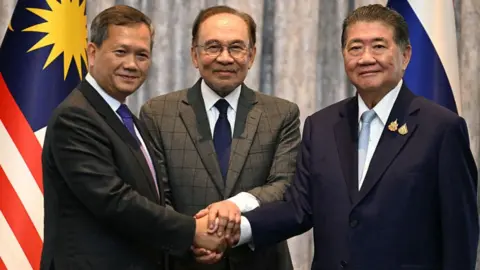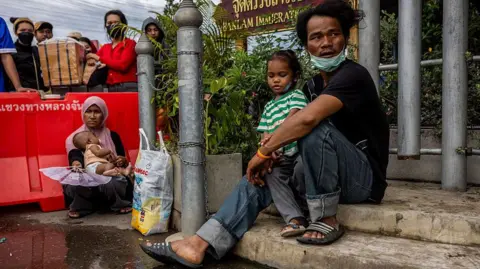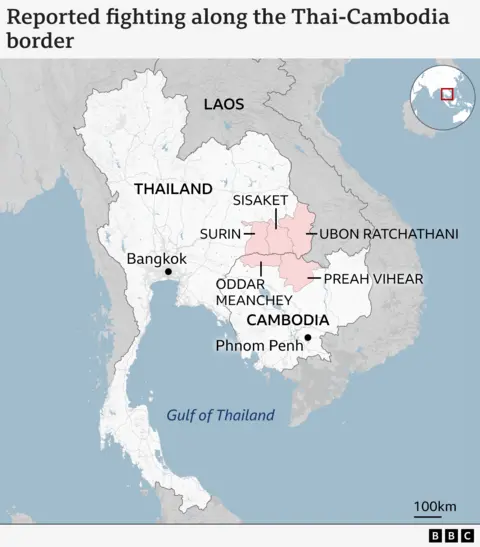Thailand and Cambodia agree to ‘immediate ceasefire’
7 minutes agoJonathan HeadSouth East Asia correspondent in BangkokJoel GuintoBBC News in Singapore

 Getty Images
Getty ImagesThailand and Cambodia have agreed to an “immediate and unconditional ceasefire” after five days of fighting at their border killed at least 33 people and displaced tens of thousands.
“This is a vital first step to a de-escalation and a restoration of peace and security,” said Malaysian Prime Minister Anwar Ibrahim, flanked by his Thai and Cambodian counterparts, as he announced that hostilities would end at midnight.
Thailand initially rebuffed his offer to mediate but agreed after US President Donald Trump said tariff negotiations would not proceed until “fighting STOPS”.
Tensions over the century-old border dispute had ramped up in May after a Cambodian soldier was killed in a clash.
Thailand imposed restrictions on citizens and tourists heading into Cambodia via land, while Cambodia banned some imports from Thailand, including fruits, power and internet services. Local Cambodian outlets reported that hundreds of thousands of workers had returned from Thailand since May.
The situation escalated last week, after a Thai soldier lost his leg in a landmine explosion. Thailand closed some of its border crossings with Cambodia, expelled their ambassador and recalled its own.
Both sides exchanged gunfire early last Thursday, with each claiming the other had triggered the conflict which has now killed more than 30 people on both sides.
Many of the casualties on the Thai side have been civilians in villages hit by rockets, according to Thailand’s army. Cambodia has said 13 people have been killed so far on their side, including eight civilians.
Shells and rockets continued to land in both countries even as the peace talks were underway.
Anwar said that Malaysia and other members of the regional bloc, Association of South East Asian Nations or Asean, were on hand to help monitor the ceasefire.
Cambodia’s Prime Minister Hun Manet described it as a very good meeting that he hoped would immediately stop the fighting. Cambodia has been pushing for a ceasefire since Friday, as its outgunned forces have been driven back by the Thai military.
The acting Thai PM Phumtham Wechayachai spoke briefly, promising to honour the ceasefire.
Both leaders also thanked the US and China whose representatives attended the talks. Thailand and Cambodia are trying to negotiate a trade deal with Washington, and China remains an important trading partner with influence.

 Getty Images
Getty ImagesIt will still take many days to carry out a verified withdrawal of troops on both sides and for emotions to cool given the destruction and loss of life over the past five days.
Older evacuees near the Thai border who had lived through bombardments during the Cambodian Civil War of the 1980s told the BBC last week that this is the worst they had experienced.
The Thai military had said on Sunday that more that nearly 140,000 civilians had been evacuated to shelters across seven provinces.
In Cambodia, where the press is severely restricted, the pro-state Khmer Times quoted a defence ministry spokesperson who said about 135,000 people along the border were relocated on Sunday.
A 75-year-old Cambodian woman who was evacuated to a shelter told the BBC earlier on Monday that she still did not feel safe because she could hear Thai drones fly over the tents.
She said she wanted to “see the war stop this evening”.

